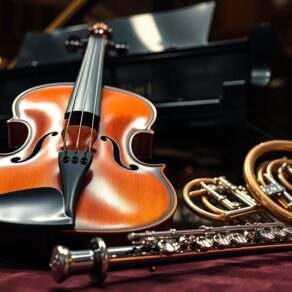Investing in a professional flute is worthwhile for serious musicians. These flutes offer superior sound quality, using high-grade materials that enhance tonal richness. You'll notice a clear, vibrant sound that supports advanced playing techniques and encourages exploring new styles. Professional flutes are durable and can retain or even appreciate in value over time, making them a smart choice for long-term use. When selecting one, consider factors like key materials, ergonomic design, and customization options. Understanding the top brands and craftsmanship can also guide your investment. Discovering the right model can greatly impact your musical experience and growth.
Benefits of Professional Flutes
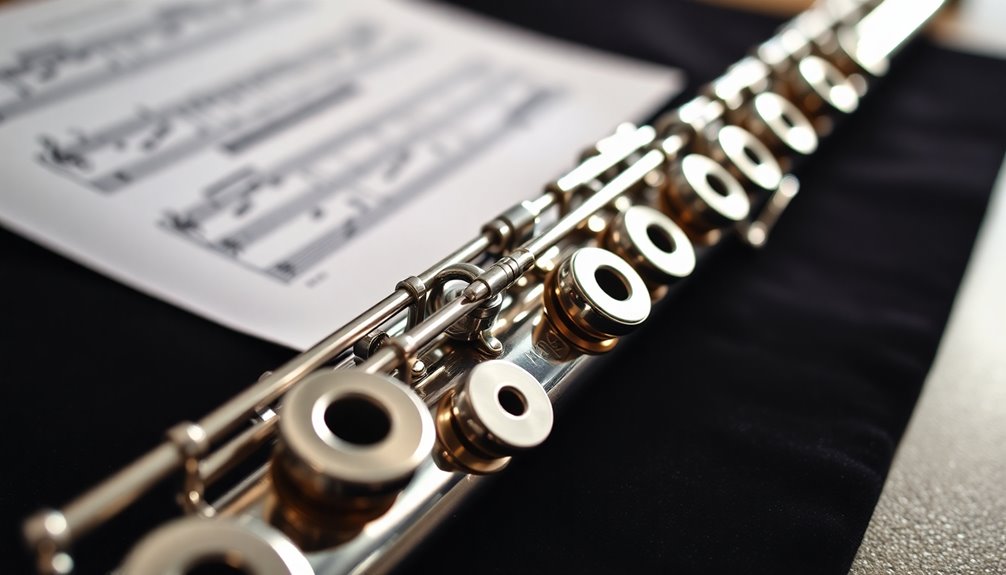
When you invest in a professional flute, you're not just buying an instrument; you're enhancing your musical potential. Professional flutes are designed to deliver superior sound quality, which can profoundly affect your playing experience. Unlike student models, these instruments utilize higher-quality materials and precise craftsmanship, resulting in a richer, more resonant tone. As you progress in your musical journey, the ability to produce a clear, vibrant sound becomes increasingly important, and a professional flute allows you to achieve that.
Moreover, the playing experience with a professional flute is often more comfortable and responsive. These flutes are meticulously engineered to provide smoother key action and better ergonomics, enabling you to play longer without discomfort. You might find that your fingers move more fluidly, allowing for greater expression and dynamic control. This responsiveness encourages you to explore new techniques and styles, further expanding your musical repertoire.
Additionally, the tonal versatility of professional flutes means you can adapt your sound to various genres, whether you're playing classical, jazz, or contemporary music. This adaptability not only enhances your personal playing experience but also fosters a sense of belonging in diverse musical communities. Investing in a professional flute can also connect you to a rich history of craftsmanship and superior performance that many renowned brands uphold.
Ultimately, investing in a professional flute is about more than just the instrument; it's an investment in your growth as a musician. By prioritizing sound quality and an exceptional playing experience, you empower yourself to reach new heights in your musical endeavors.
Key Features to Consider
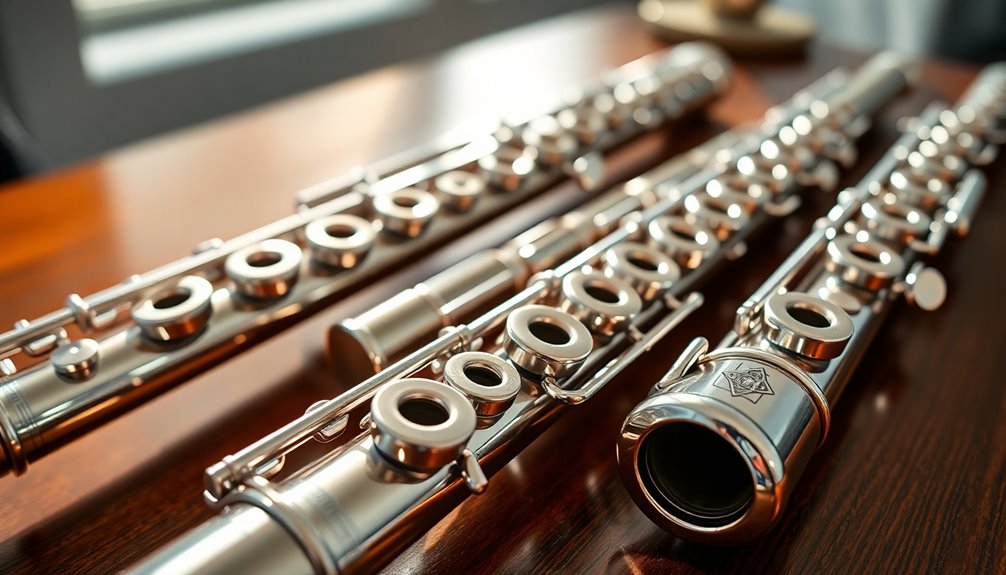
Choosing the right professional flute involves considering several key features that can greatly influence your playing experience.
These features not only affect sound quality but also your comfort and ease of play. Here are four essential aspects to keep in mind:
- Key Materials: The choice of materials used in the construction of a flute considerably impacts its sound and durability. Common materials include silver, gold, and even platinum. Silver flutes offer a warm tone, while gold can provide a richer sound. Consider what resonates with your style. Higher-grade materials like silver-plated metal typically improve tonal quality and durability.
- Ergonomic Design: An ergonomic design is vital for comfort during prolonged playing sessions. Look for flutes that feature well-placed keys and a comfortable grip. This design helps reduce strain, allowing you to focus on your music rather than your instrument.
- Mechanism and Key Layout: The mechanism of the flute should feel intuitive. Many professional flutes have different key layouts, such as open or closed holes. Choose a layout that aligns with your playing style and skill level.
- Customization Options: Some manufacturers offer customization options, allowing you to tailor your flute to your specific needs. This can include adjustments to the key height, pad material, or even the finish of the instrument.
Top Brands to Explore
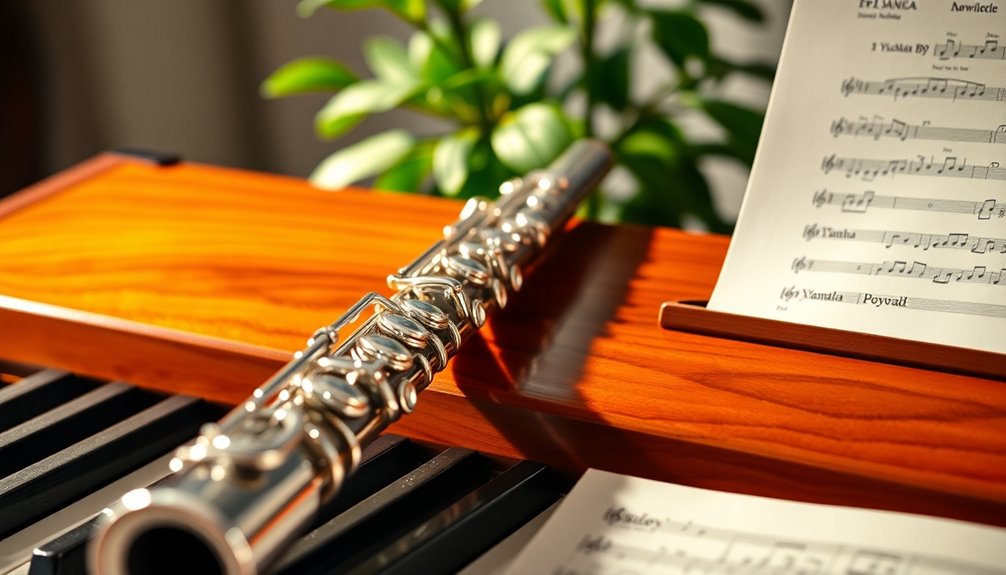
Finding the right professional flute goes beyond key features; exploring top brands can greatly enhance your playing experience. When it comes to premium quality, two brands stand out: Yamaha and Powell. Both have earned their reputation among musicians and can offer you distinct advantages.
Yamaha flutes are known for their exceptional craftsmanship and innovative design. They provide a range of models that cater to various playing styles and preferences. Whether you're a beginner or a seasoned player, Yamaha instruments deliver consistent sound quality and playability. Their flutes often feature advanced materials and technology, which can help you achieve a rich tone and smooth response. The Yamaha YFL-222, for instance, is designed for student and intermediate players seeking reliability and quality.
On the other hand, Powell flutes are synonymous with artistry and tradition. Each Powell flute is crafted with great attention to detail, often considered a work of art in its own right. These flutes offer a warm, full-bodied sound that many professional musicians seek. Powell's commitment to quality means that their instruments aren't only beautiful but also reliable, making them a trusted choice for serious players.
Exploring these brands can help you find a flute that resonates with your personal style. By investing in a Yamaha or Powell flute, you're joining a community of musicians who appreciate the nuances of quality instruments.
Ultimately, your choice of brand can profoundly impact your playing journey, enhancing both your skills and enjoyment.
How to Choose the Right Model
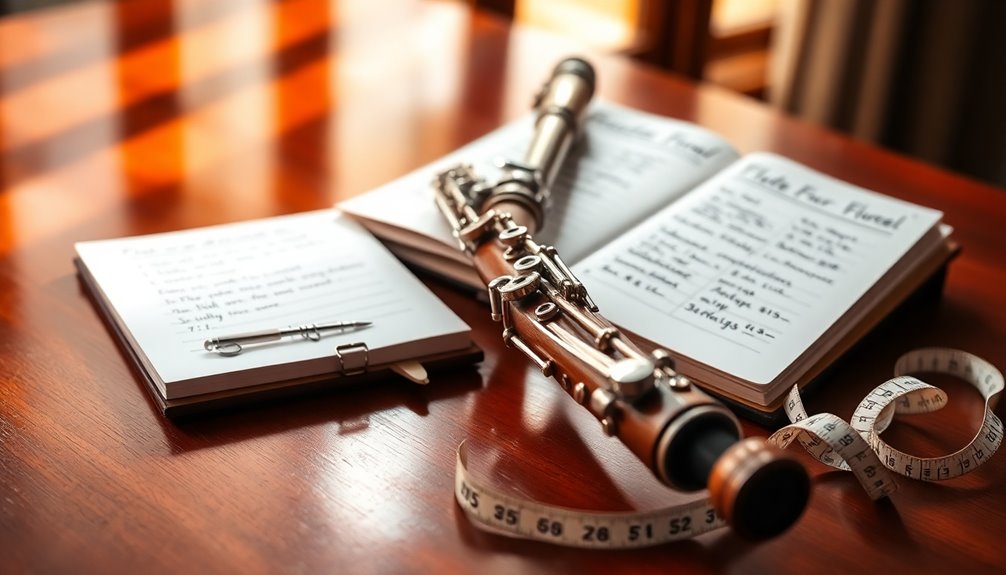
Determining the right professional flute model requires careful consideration of various factors tailored to your playing style and skill level.
With so many options available, making an informed choice can feel overwhelming. To help you navigate the process, consider these key factors in your model comparison:
- Material: Professional flutes are typically made from silver, gold, or a combination of metals. Each material offers unique tonal qualities, so think about what sound resonates with you.
- Key Mechanism: Look at the type of key system that best suits your playing. Open-hole keys provide greater flexibility, while closed-hole keys may be easier for beginners to manage.
- Foot Joint: Decide between a B-foot or C-foot joint. A B-foot allows for extended range, while a C-foot is lighter and easier to handle.
- Customization Options: Many brands offer customization for your flute, including headjoint modifications. Additionally, consider how the flute's material quality and safety can affect your overall playing experience.
Understanding your player preferences can guide you in selecting the features that will enhance your performance.
Long-Term Value and Durability
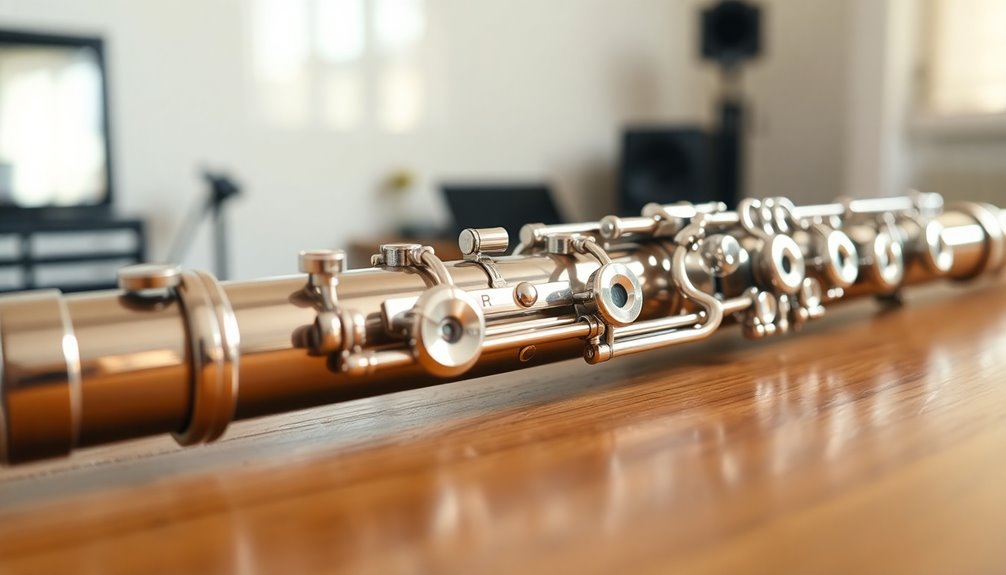
When investing in a professional flute, understanding long-term value and durability is essential for any musician. You want an instrument that not only sounds good today but continues to perform well for years to come. The longevity guarantee offered by high-quality flutes often stems from superior craftsmanship quality. When these two elements come together, you can feel confident in your purchase.
A well-crafted flute uses durable materials, such as silver or gold, which resist wear and corrosion. This means your instrument can withstand the rigors of regular use, whether you're practicing daily or performing in various environments.
Furthermore, reputable manufacturers implement meticulous quality control processes to guarantee that each flute meets specific performance standards. Additionally, investing in a professional flute often involves considering the importance of expert advice to ensure you choose the right instrument for your skill level and playing style.
Investing in a professional flute also means considering the potential for future repairs and maintenance. High-quality flutes are generally easier to service, and parts are often more readily available. This aspect not only extends the life of your instrument but also keeps it performing at its best.
In addition, many professional flutes come with warranties or guarantees that reflect the manufacturer's confidence in their durability. This added security can provide peace of mind, knowing that your investment is protected.
Ultimately, when you prioritize longevity guarantee and craftsmanship quality, you're not just buying an instrument; you're investing in a lifelong companion that can grow with you as a musician. Choosing wisely guarantees you'll feel a sense of belonging and pride in your instrument for years to come.
Frequently Asked Questions
What Is the Average Price Range for Professional Flutes?
When you're looking at professional flutes, you'll find average prices typically range from $1,500 to $5,000.
Factors like material, brand, and flute features—such as key types and body construction—impact these costs.
Higher-end models often boast advanced features for better sound quality and playability.
It's crucial to evaluate what you need in a flute, as investing in quality can enhance your performance and overall playing experience considerably.
Are There Specific Brands Favored by Professional Flutists?
When it comes to professional flutists, you'll find certain flute brands often rise to the top of their lists.
Brands like Yamaha, Powell, and Haynes receive consistent professional recommendations for their quality and craftsmanship.
You're not just picking a flute; you're investing in your sound and skill.
How Often Should Professional Flutes Be Serviced?
You should aim to service your professional flute at least once a year.
Regular maintenance helps guarantee peak performance and longevity. If you play frequently or notice changes in sound quality, consider increasing the service frequency to every six months.
Use maintenance tips like keeping it clean and avoiding extreme temperatures to prolong its life.
Can Beginners Use Professional Flutes Effectively?
Imagine stepping onto a stage, the spotlight warm against your skin.
Can beginners use professional flutes effectively? Yes, they can, but it's crucial to evaluate their beginner experience.
While professional flutes offer superior sound quality and construction, their suitability for novices depends on the player's commitment and willingness to learn.
A professional flute can inspire growth, but it may also overwhelm if the fundamental techniques aren't mastered first.
Choose wisely!
What Materials Are Commonly Used in Professional Flutes?
When considering professional flutes, you'll find materials like silver and gold, each offering distinct tonal qualities.
Silver provides a bright, clear sound, while gold enriches warmth and depth.
Additionally, you might encounter wood flutes, which offer a unique, warm timbre, contrasting with metal flutes that are more durable and consistent.
Choosing between these materials depends on your personal preference and the sound you want to achieve, shaping your musical identity in the process.
Conclusion
To sum up, investing in a professional flute is akin to choosing a trusty steed for a journey; it can elevate your musical experience and propel you toward excellence. By considering the benefits, key features, and reputable brands, you can make an informed decision that suits your needs. Remember, the right flute not only enhances your sound but also stands the test of time, offering long-term value that resonates beyond the initial purchase.



